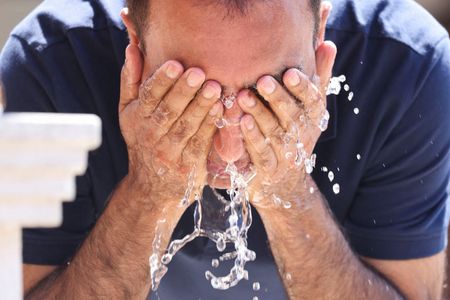By Joseph Campbell and Alessandra Prentice
ZAPORIZHZHIA, Ukraine (Reuters) -Russia unleashed rockets on Tuesday on an encircled steel works in Mariupol, Ukraine’s last redoubt in the port city, after a ceasefire broke down with some civilians still trapped beneath the sprawling site despite a U.N.-brokered evacuation.
However, scores of evacuees who managed to leave under U.N. and Red Cross auspices at the weekend after cowering for weeks under the Azovstal plant finally reached the relative safety of Ukraine-controlled Zaporizhzhia.
“We would have hoped that many more people would have been able to join the convoy and get out of hell. That is why we have mixed feelings,” Pascal Hundt from the International Committee of the Red Cross (ICRC) told journalists by Zoom.
Weary-looking people, including children and pensioners, clambered off buses after escaping the ruins of their home town in southeast Ukraine where Russia now claims control.
“We had said goodbye to life, we didn’t think anyone knew we were there,” said Valentina Sytnykova, 70, who said she sheltered in the plant for two months with her son and 10-year-old granddaughter.
Russia has turned its heaviest firepower on Ukraine’s east and south since failing to take Kyiv, the capital, in March.
But it has also struck targets much further west in a drive to limit Ukraine’s access to the Black Sea, vital for its grain and metal exports, and also to disrupt supplies of Western military aid to President Volodymyr Zelenskiy’s forces.
On Tuesday Russia’s defence ministry said its forces had struck a military airfield near the port of Odesa with missiles, destroying drones, missiles and ammunition supplied to Ukraine by the United States and its European allies.
Andriy Sadoviy, the mayor of Lviv, a western city near the Polish border, said late on Tuesday that air strikes had damaged power stations, cutting off electricity in some districts.
‘UKRAINE’S FINEST HOUR’
Nearly 10 weeks into a war that has killed thousands, devastated cities and driven five million Ukrainians to flee abroad, Russian President Vladimir Putin raised the economic stakes for Kyiv’s Western backers on Tuesday by announcing plans to block the export of vital Russian raw materials.
The European Union said new sanctions on Russia would target its oil industry and banks, and that it also planned to replace two-thirds of its Russian gas use by the end of 2022, part of efforts to deplete Moscow’s war-chest.
The U.S. Congress is considering a $33 billion military aid package, and British Prime Minister Boris Johnson announced a further 300 million pounds ($375 million) in aid, including electronic warfare equipment and a counter-battery radar system.
“This is Ukraine’s finest hour, (one) that will be remembered and recounted for generations to come,” Johnson told Ukraine’s parliament via videolink, echoing the words of Britain’s wartime leader Winston Churchill in 1940.
French President Emmanuel Macron urged Putin in a phone call on Tuesday to order an immediate ceasefire in Ukraine and to lift Russia’s embargo on Ukrainian exports via the Black Sea. Putin said Russia remained open to dialogue, the Kremlin said.
Zelenskiy put the preliminary cost of war damage in Ukraine so far at around $600 billion, adding in comments via videolink to a Wall Street Journal event: “…The aggressor has to be isolated economically, full complete economic isolation, and that will allow Ukraine to fight to defend our rights.”
German Chancellor Olaf Scholz said Putin’s policies were “imperialistic”, and that he would support Finland and Sweden if they decided to join NATO, as each is now considering.
Scholz has previously been accused of being too soft on Moscow but has now thrown Germany’s support behind the EU plans for a ban on Russian oil imports.
EU countries have paid more than 47 billion euros ($47.43 billion) to Russia for gas and oil since it invaded Ukraine, said the Centre for Research on Energy and Clean Air.
Under the decree signed by Putin on Tuesday, Russia’s government has 10 days to draw up a sanctions list targeting specific people and entities in “unfriendly” states.
Pummelled by Western sanctions, Russia’s own $1.8 trillion economy is heading for its biggest contraction since the years following the 1991 break-up of the Soviet Union.
‘POWERFUL ASSAULT’
Osnat Lubrani, U.N. humanitarian coordinator for Ukraine, said 101 evacuees had reached Zaporizhzhia on Tuesday from Mariupol.
“I can’t believe I made it, we just want rest,” said Alina Kozitskaya, who spent weeks sheltering in a basement.
Mariupol, a city of 400,000 before Russia launched its invasion on Feb. 24, has seen the bloodiest fighting of the war, enduring weeks of siege and shelling. Some 100,000 civilians are still in the ruined city.
In a Telegram video from the steel plant, Captain Sviatoslav Palamar of Ukraine’s Azov Regiment said Russia had pounded Azovstal with naval and barrel artillery through the night and dropped heavy bombs from planes.
Reuters could not independently verify his account. However, Reuters images on Monday showed volleys of rockets fired from a Russian truck-mounted launcher towards Azovstal.
“As of this moment, a powerful assault on the territory of the Azovstal plant is under way with the support of armoured vehicles, tanks, attempts to land on boats and a large number of infantry,” Palamar said.
Russia calls its actions a “special operation” to disarm Ukraine and protect it from fascists. Ukraine and the West say the fascist allegation is baseless and that the war is an unprovoked act of aggression.
At least 10 people were killed and 15 wounded by Russian shelling of a coking plant in the city of Avdiivka in the Donetsk region of eastern Ukraine on Tuesday, the regional governor said. The Ukrainian president’s office said earlier other areas of Donetsk were under constant fire.
Ukraine’s prosecutor general, visiting the shattered town of Irpin near Kyiv on Tuesday, accused Russia of using rape as a tactic of war. Iryna Venediktova also described Putin as “the main war criminal of the 21st century”.
Russia denies targeting civilians and rejects charges that its forces have committed war crimes.
(Additional reporting by Pavel Polityuk and Tom Balmforth in Kyiv, Michel Rose in Paris, Kylie MacLellan and Max Hunder in London, Sarah Marsh in Berlin, Philip Pullella in Vatican City; Writing by Frank Jack Daniel and Gareth Jones; Editing by Nick Macfie, Mark Heinrich and Cynthia Osterman)













